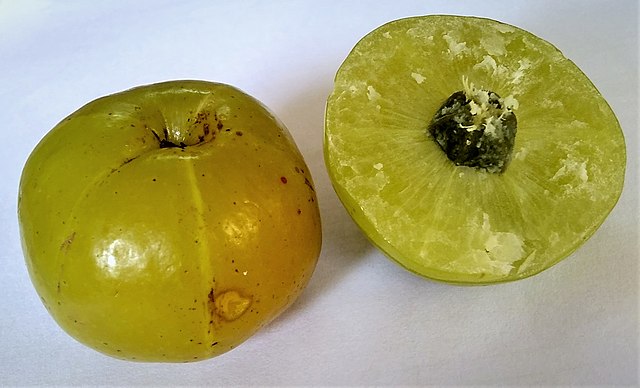Common Names and Other Names:
- Amla
- Indian Gooseberry
- Emblica
- Amalaki (in Ayurveda)
- Phyllanthus emblica
- Malacca Tree
- Myrobalan
Where Does It Occur:
Amla is native to India and also grows in:
- Southeast Asia
- China
- Malaysia
- Sri Lanka
- Pakistan
It thrives in tropical and subtropical climates, preferring:
- Dry, deciduous forests
- Hilly areas
- Riverbanks
The tree grows well in a variety of soils, including sandy, loamy, and clayey soils, and can tolerate both drought and heavy rainfall.
Basic Ingredients (Constituents):
Amla is rich in numerous bioactive compounds:
- Vitamin C:
- One of the highest natural sources; potent antioxidant.
- Polyphenols:
- Gallic Acid
- Ellagic Acid
- Chebulinic Acid
- Quercetin
- Kaempferol
- Tannins:
- Emblicanin A and B
- Punigluconin
- Pedunculagin
- Flavonoids
- Amino Acids
- Pectin
- Minerals:
- Calcium
- Iron
- Phosphorus
- Chromium
- Zinc
These constituents contribute to amla’s antioxidant, anti-inflammatory, immunomodulatory, and anti-aging properties.
Most Commonly Used For Treatment Of:
- Immune System Support:
- Enhances immunity due to high vitamin C and antioxidant content.
- Digestive Health:
- Constipation Relief: High fiber content aids bowel movements.
- Gastric Protection: Reduces acidity and heals ulcers.
- Diabetes Management:
- Blood Sugar Regulation: Improves insulin sensitivity and lowers blood glucose levels.
- Heart Health:
- Cholesterol Management: Lowers total cholesterol and triglyceride levels.
- Antihypertensive Effects: May help reduce blood pressure.
- Skin and Hair Care:
- Anti-aging: Antioxidants combat oxidative stress.
- Hair Growth: Nourishes hair follicles, reduces hair fall, and prevents premature graying.
- Anti-inflammatory Effects:
- Reduces inflammation in conditions like arthritis.
- Liver Health:
- Hepatoprotective: Protects liver cells from toxins.
- Eye Health:
- Vision Improvement: Supports eye health due to vitamin A content.
Side Effects:
Amla is generally safe when consumed in moderate amounts, but potential side effects may include:
- Gastrointestinal Issues:
- Stomach Upset
- Diarrhea
- Acidity or Heartburn in sensitive individuals.
- Allergic Reactions:
- Rare but may include skin rash, itching, or swelling.
- Interaction with Medications:
- Antidiabetic Drugs: May enhance blood sugar-lowering effects.
- Anticoagulants: Potential risk of increased bleeding.
- Electrolyte Imbalance:
- High intake may lead to decreased sodium levels.
Available Forms in the Market:
- Fresh Fruits:
- Consumed raw or in culinary dishes.
- Dried Amla:
- Used in snacks or as a supplement.
- Amla Powder:
- Made from dried fruits; used in supplements, hair masks, and skincare.
- Amla Juice:
- Consumed for health benefits.
- Capsules/Tablets:
- Contain amla extract for convenient dosing.
- Amla Oil:
- Used topically for hair and skin care.
- Pickles and Preserves:
- Culinary uses in traditional dishes.
- Herbal Formulations:
- Chyawanprash: A traditional Ayurvedic tonic containing amla.
Research and Results:
- Antioxidant Properties:
- Study: “Antioxidant activity of Indian gooseberry (Emblica officinalis) and its protective effect on oxidative DNA damage.”
- Findings: Demonstrated strong antioxidant activity, protecting cells from oxidative stress.
- Reference: Phytotherapy Research
- Antidiabetic Effects:
- Study: “Hypoglycemic effects of Phyllanthus emblica in diabetic patients.”
- Findings: Significant reduction in fasting and postprandial blood glucose levels.
- Reference: Journal of Ethnopharmacology
- Cholesterol Reduction:
- Study: “Effect of amla on serum cholesterol levels in men aged 35-55 years.”
- Findings: Decreased total cholesterol, LDL cholesterol, and triglycerides.
- Reference: European Journal of Clinical Nutrition
- Liver Protection:
- Study: “Hepatoprotective activity of amla against chemical-induced liver injury.”
- Findings: Prevented liver damage and improved liver function tests.
- Reference: Food and Chemical Toxicology
- Anti-inflammatory Effects:
- Study: “Anti-inflammatory activity of Phyllanthus emblica in arthritis models.”
- Findings: Reduced inflammation and pain in animal models.
- Reference: Inflammopharmacology
Precautions:
- Pregnancy and Breastfeeding:
- Use with Caution: Insufficient reliable information; consult a healthcare provider.
- Diabetes:
- Monitor Blood Sugar Levels: May lower glucose levels; adjust medications accordingly.
- Bleeding Disorders:
- Increased Bleeding Risk: Use cautiously if you have a bleeding disorder or are on anticoagulant therapy.
- Surgery:
- Discontinue Use: At least two weeks before scheduled surgery due to effects on blood sugar and clotting.
- Gastrointestinal Sensitivity:
- Acidity: Those with a sensitive stomach or acid reflux should consume in moderation.
- Medication Interactions:
- Antidiabetic Medications: Risk of hypoglycemia.
- Antihypertensive Drugs: May enhance blood pressure-lowering effects.
Conclusion:
Amla (Phyllanthus emblica), or Indian gooseberry, is a potent medicinal fruit revered in Ayurvedic medicine for its wide-ranging health benefits. Rich in vitamin C and antioxidants, it supports immune function, promotes heart health, aids in diabetes management, and enhances skin and hair health. While generally safe, it’s important to consume amla in moderation and be aware of potential interactions with medications.
Recommendations:
- Consult a Healthcare Professional:
- Before using amla for medicinal purposes, especially if you have underlying health conditions or are taking medications.
- Moderation:
- Incorporate amla into your diet in recommended amounts.
- Quality Products:
- Choose reputable brands to ensure purity and efficacy.
- Monitor Health Parameters:
- Keep track of blood sugar and blood pressure if relevant.
Disclaimer:
This information is intended for educational purposes and should not replace professional medical advice. Always consult a qualified healthcare provider for personalized guidance before using amla for medicinal purposes.
« Back to Glossary Index